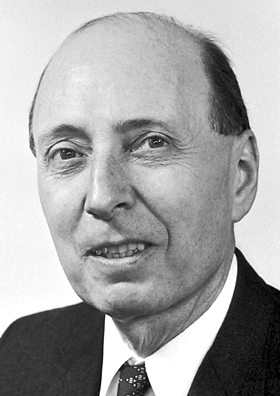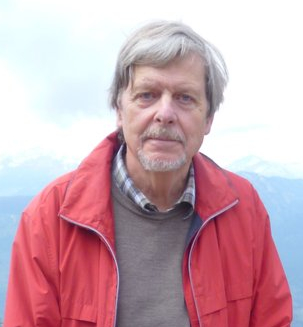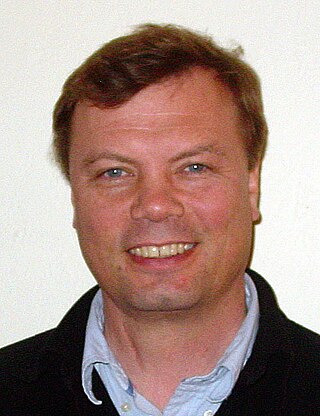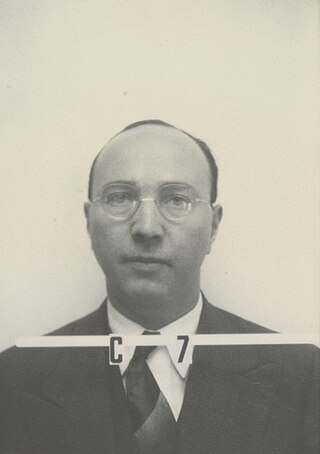Related Research Articles

Eugene Paul Wigner was a Hungarian-American theoretical physicist who also contributed to mathematical physics. He received the Nobel Prize in Physics in 1963 "for his contributions to the theory of the atomic nucleus and the elementary particles, particularly through the discovery and application of fundamental symmetry principles".

Hermann Klaus Hugo Weyl, was a German mathematician, theoretical physicist, logician and philosopher. Although much of his working life was spent in Zürich, Switzerland, and then Princeton, New Jersey, he is associated with the University of Göttingen tradition of mathematics, represented by Carl Friedrich Gauss, David Hilbert and Hermann Minkowski.

Yang Chen-Ning or Chen-Ning Yang, also known as C. N. Yang or by the English name Frank Yang, is a Chinese theoretical physicist who made significant contributions to statistical mechanics, integrable systems, gauge theory, and both particle physics and condensed matter physics. He and Tsung-Dao Lee received the 1957 Nobel Prize in Physics for their work on parity non-conservation of weak interaction. The two proposed that the conservation of parity, a physical law observed to hold in all other physical processes, is violated in the so-called weak nuclear reactions, those nuclear processes that result in the emission of beta or alpha particles. Yang is also well known for his collaboration with Robert Mills in developing non-abelian gauge theory, widely known as the Yang–Mills theory.
The Carl-Gustaf Rossby Research Medal is the highest award for atmospheric science of the American Meteorological Society. It is presented to individual scientists, who receive a medal. Named in honor of meteorology and oceanography pioneer Carl-Gustaf Rossby, who was also its second (1953) recipient.

Alexander Markovich Polyakov is a Russian theoretical physicist, formerly at the Landau Institute in Moscow and, since 1989, at Princeton University, where he is the Joseph Henry Professor of Physics Emeritus.

Bertram Kostant was an American mathematician who worked in representation theory, differential geometry, and mathematical physics.

Detlev Buchholz is a German theoretical physicist. He investigates quantum field theory, especially in the axiomatic framework of algebraic quantum field theory.

Giorgio Parisi is an Italian theoretical physicist, whose research has focused on quantum field theory, statistical mechanics and complex systems. His best known contributions are the QCD evolution equations for parton densities, obtained with Guido Altarelli, known as the Altarelli–Parisi or DGLAP equations, the exact solution of the Sherrington–Kirkpatrick model of spin glasses, the Kardar–Parisi–Zhang equation describing dynamic scaling of growing interfaces, and the study of whirling flocks of birds. He was awarded the 2021 Nobel Prize in Physics jointly with Klaus Hasselmann and Syukuro Manabe for groundbreaking contributions to theory of complex systems, in particular "for the discovery of the interplay of disorder and fluctuations in physical systems from atomic to planetary scales".

Nicolai Yuryevich Reshetikhin is a mathematical physicist, currently a professor of mathematics at Tsinghua University, China and a professor of mathematical physics at the University of Amsterdam. He is also a professor emeritus at the University of California, Berkeley. His research is in the fields of low-dimensional topology, representation theory, and quantum groups. His major contributions are in the theory of quantum integrable systems, in representation theory of quantum groups and in quantum topology. He and Vladimir Turaev constructed invariants of 3-manifolds which are expected to describe quantum Chern–Simons field theory introduced by Edward Witten.

François, Baron Englert is a Belgian theoretical physicist and 2013 Nobel Prize laureate.

William Conyers Herring was an American physicist. He was a professor of applied physics at Stanford University and the Wolf Prize in Physics recipient in 1984/5.

Debashis Mukherjee is a theoretical chemist, well known for his research in the fields of molecular many body theory, theoretical spectroscopy, finite temperature non-perturbative many body theories. Mukherjee has been the first to develop and implement a class of many-body methods for electronic structure which are now standard works in the field. These methods, collectively called multireference coupled cluster formalisms, are versatile and powerful methods for predicting with quantitative accuracy the energetics and cross-sections of a vast range of molecular excitations and ionization. A long-standing problem of guaranteeing proper scaling of energy for many electron wave-functions of arbitrary complexity has also been first resolved by him. He has also been the first to develop a rigorously size-extensive state-specific multi-reference coupled cluster formalism, and its perturbative counterpart which is getting increasingly recognized as a very promising methodological advance.
The John J. Carty Award for the Advancement of Science is awarded by the U.S. National Academy of Sciences "for noteworthy and distinguished accomplishments in any field of science within the charter of the Academy". Established by the American Telephone and Telegraph Company (AT&T) and first awarded in 1932, the medal has been awarded in specific fields since 1961. The recipient is awarded a $25,000 prize.
Alexander Borisovich Zamolodchikov is a Russian physicist, known for his contributions to conformal field theory, statistical mechanics, string theory and condensed matter physics.

Jinchao Xu is an American-Chinese mathematician. He is currently the Verne M. Willaman Professor in the Department of Mathematics at the Pennsylvania State University, University Park. He is known for his work on multigrid methods, domain decomposition methods, finite element methods, and more recently deep neural networks.
John Lawrence CardyFRS is a British–American theoretical physicist. He is best known for his work in theoretical condensed matter physics and statistical mechanics, and in particular for research on critical phenomena and two-dimensional conformal field theory.

Constantinos Daskalakis is a Greek theoretical computer scientist. He is a professor at MIT's Electrical Engineering and Computer Science department and a member of the MIT Computer Science and Artificial Intelligence Laboratory. He was awarded the Rolf Nevanlinna Prize and the Grace Murray Hopper Award in 2018.

Joseph Oakland Hirschfelder was an American physicist who participated in the Manhattan Project and in the creation of the nuclear bomb.
Simon Caron-Huot is a Canadian theoretical physicist.
References
- ↑ "International Colloquium on Group Theoretical Methods in Physics | ICGTMP" . Retrieved 2023-10-08.
- ↑ "The Wigner Medal Bylaws" (PDF). The Group Theory and Fundamental Physics Foundation. Archived from the original (PDF) on 2014-08-17. Retrieved 2007-08-07.
- ↑ "The Wigner Medal". The Group Theory and Fundamental Physics Foundation. Archived from the original on 2007-11-02. Retrieved 2007-08-07.
- ↑ "The Weyl–Wigner Award | International Colloquium on Group Theoretical Methods in Physics" . Retrieved 2023-10-08.
- ↑ "Hermann Weyl Prize". The 34th International Colloquium on Group Theoretical Methods in Physics. Retrieved 2023-10-22.
- ↑ "Wigner Medal Homepage". Archived from the original on 2007-11-02. Retrieved 2005-12-18.
- ↑ "Professor Emeritus Alden Mead receives Wigner Medal". University of Minnesota Department of Chemistry. Retrieved 2012-07-16.
- ↑ "The XXIX International Colloquium on Group-Theoretical Methods in Physics". Chern Institute of Mathematics, Nankai University. Retrieved 2012-07-16.
- ↑ "Wigner Medal awarded to Professor Joshua Zak". Technion – Israel Institute of Technology – Physics Department. Retrieved 2014-03-18.